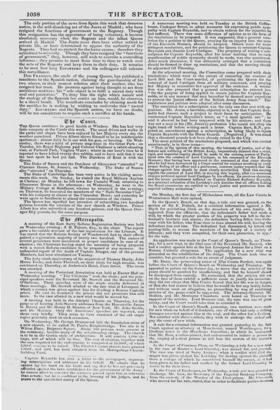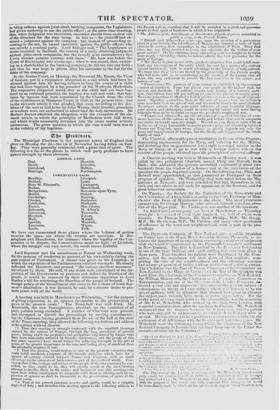In the Queen's Bench, on that day, a rule nisi
was granted, on the motion of Sir F. Pollock, for a criminal information against a Mr. Blyth for publishing libels on the members of his own family. It appeared from the affidavits, that the defendant's father had made a will, by which the greater portion of his property was left to the de- fendant's brothers and sisters ; the defendant having fallen into disfa- vour with his father, who from time to time altered his will, leaving the defendant less and less. The defendant had threatened, by letters and posting-bills, to accuse the members of his family of a variety of offences; and they were compelled, for their own protection, to app,,, for the rule.
An application was made to the Court of Queen's Bench, on Thurs- day, for a new trial, in the libel case of the Reverend Mr. Stowell, who had a verdict against him at the last Liverpool Assizes for a libel on a Roman Catholic clergyman. The application for a new trial was grounded on the misdirection of the Judge. The Court took time to consider, but granted a rule for an arrest of judgment.
Mr. Dunn, the persevering suitor of Miss Coutts Burdett, was again before the Court of' Queen's Bench on Wednesday and Thursday. He appeared in person on the former day, to move that the articles of the peace should be quashed for insufficiency, and that he himself should be discharged from custody. Ile contended, that the articles did not on the face of them exhibit a sufficient cause to justify his detention: they did not allege that Miss Coutts feared that her life was in danger, or that she had reason to believe that he would do her any bodily harm; and without such an allegation, no proceeding by way of exhibiting articles of the peace could be supported. The Attorney-General, Mr. Bodkin, and Mr. Montague Chatnbers, were heard on Thursday in support of the articles. Lord Denman said, the case was one of great nicety, and the Court would take time to consider it.
In the Court of Queen's Bench, yesterday, two motions were made for new trials on behalf of defendants, one of whom had only a shilling damages awarded against him at the trial, and the other but a farthing. Not satisfied with these verdicts, they wish to undergo the ordeal lind pay the costs of new trials.
A rule for a criminal information was granted yesterday in the Bail Court, against an attorney at Manchester, named Worthington, for a libellous letter in the Manchester Gwirdiun ; in which he insinuated that Mr. Ross, a calico-printer, had endeavoured to induce a person In the employ of a rival printer to tell hint the secrets of his master a trade.
In the Court of Common Pleas, on Wednesday, a rule for a new trial in the ease of Bunter v. Lord Grantley, was moved for, and granted. The case was tried at Sorry Assizes', when a verdict with :25o/. da- mages was givvii ag.thIst his Lordship fbr having ejected the plaintiff from a cottage ol which he considered himself the owner, as it had been given to his father and mother by the former Lord Grantley to reside in for t heir lives.
In the Coo ft of Exchequer, on Wednesday, a rule nisi was grantol to discharge Mr. Law, the Secretary of the In Batik ing Comealiy,
front the custody of the Warden of the Fleet prison. Mr. Cre,swell, who moved for the rule, stated, that in order to facilitate parties desirous
to bring actions against joint-stock banking companies, the Legislature had given authority to sue the public officer ; at the same time enacting, that, when judgment was recovered, execution should issue against one of the directors for the time being. In this caee the plaintiff had ob- tained a judgment against the company ; but, instead of proceeding ac- cording to the act, he issued execution against the public officer, who was merely a nominal party. Lord Abinger said, "The Legislature no doubt intended to facilitate the remedy of a party obtaining judgment against joint-stock companies, but the remedy is so unsatisfactory that I only wonder persons contract with them." Mr. Law was before the Court of Bankruptcy two weeks ago ; when it was stated, that, except- ing as a shareholder in the banking company, he did not owe any debts ; and that he was kept in prison after his surrender to the fiat for the debts of the company.
In the Arches Court, on Monday, the Reverend Mr. Escott, the Vicar of Gedney, put in a responsive allegation to a suit which had been in- stituted against him for having refused to bury the corpse of a child that had been baptized by a lay preacher of the Wesleyan Methodists. The responsive allegation stated, that as the child had not been bap- tized by an ordained preacher, the baptism was null and void ; that bap- tisms by laymen bad been repudiated by the Church from the time of the conferences at Hampton Court, in 1600, to the present time : and in the eleventh article it was pleaded, that even according to the doc- trines of the sect as laid down by John Wesley, their founder, preachers or teachers were not authorized to adtuirister the holy sacraments. Sir Herbert Jenner admitted the allegation, with the exception of the ele- venth article, in which the principles of Methodism were laid down, and which would necessarily introduce into the cause matter entirely extraneous. The great question in which the case would turn was as to the validity of lay baptisms.



























 Previous page
Previous page